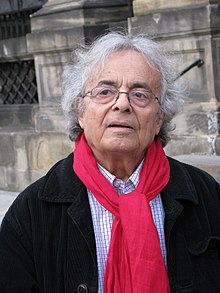Adonis (poet)
| Adunis أدونيس |
|
|---|---|

Adunis May 12, 2011
|
|
| Born | Ali Ahmad Said Esber 1 January 1930 Al Qassabin, Latakia, French Syria |
| Pen name | Adonis |
| Occupation | Poet, writer, literary critic and editor |
| Language | Arabic |
| Nationality | Syrian |
| Period | Second half of the 20th century |
| Genre | Essay, poetry |
| Literary movement | Arabic literature, Modernism |
| Notable works | The Songs of Mihyar the Damascene, The Static and the Dynamic |
| Notable awards |
Bjørnson Prize 2007 Goethe Prize 2011 |
Ali Ahmad Said Esber (Arabic: علي أحمد سعيد إسبر, romanised: ʿAlī Aḥmad Saʿīd 'Isbar, born 1 January 1930), also known by the pen name Adonis or Adunis (Arabic: أدونيس, Adūnīs), is a Syrian poet, essayist and translator who is considered one of the most influential and dominant Arab poets of the modern era. He led a modernist revolution in the second half of the 20th century, "exerting a seismic influence" on Arabic poetry comparable to T.S. Eliot's in the anglophone world.
Adonis’s publications include twenty volumes of poetry and thirteen of criticism. His dozen books of translation to Arabic include the poetry of Saint-John Perse and Yves Bonnefoy, and the first complete Arabic translation of Ovid’s Metamorphoses (2002). His multi-volume anthology of Arabic poetry (Dīwān ash-shi‘r al-‘arabī), covering almost two millennia of verse, has been in print since its publication in 1964.
Islamic authorities and scholars have opposed Adonis for his criticism of Islam. Some, such as Egyptian Salafi Mohamad Said Raslan and some faction of the Syrian opposition, issued death threats against him, and some called for his books to be burned. In spite of this opposition, Adonis is a perennial contender for the Nobel Prize in Literature, Adonis has been described as the greatest living poet of the Arab world.
Born to a modest Alawite farming family in January 1930, Adonis hails from the village of al-Qassabin near the city of Latakia in western Syria. He was unable to afford formal schooling for most of his childhood, and his early education consisted of learning the Quran in the local kuttab (mosque-affiliated school) and memorizing classical Arabic poetry, to which his father had introduced him.
...
Wikipedia
